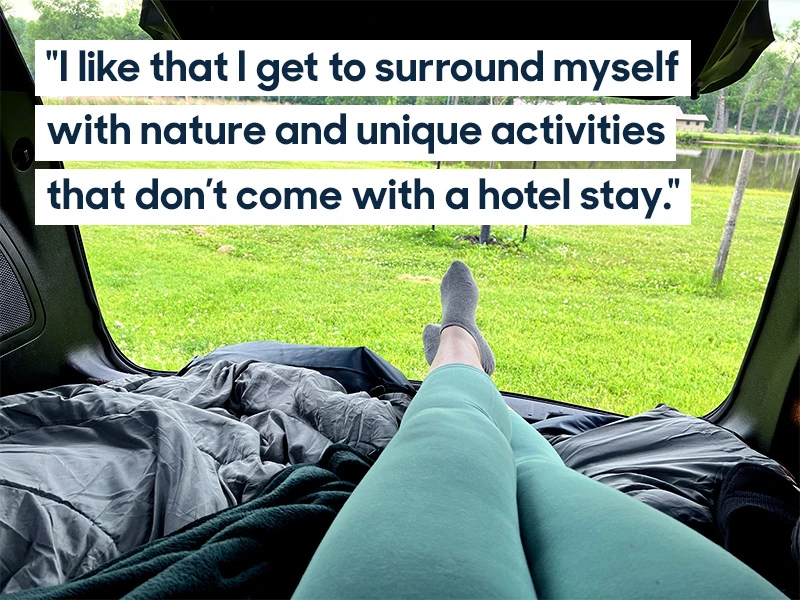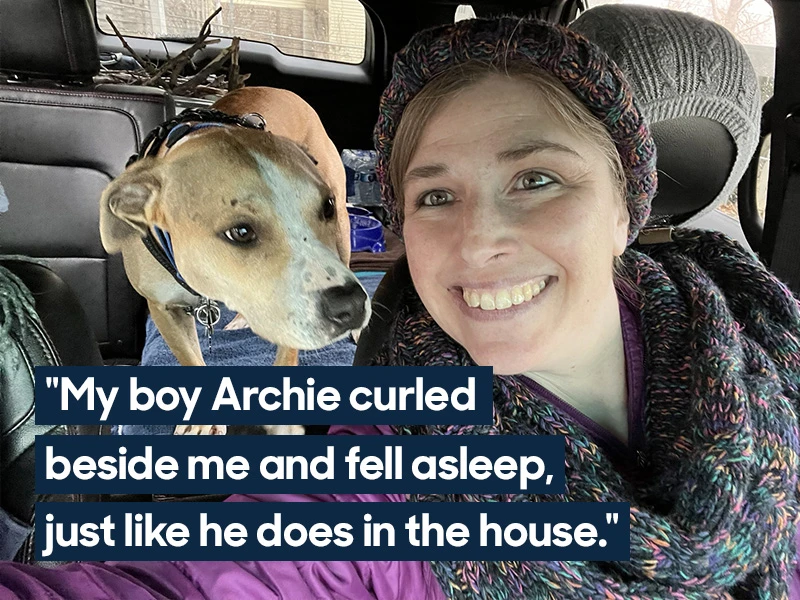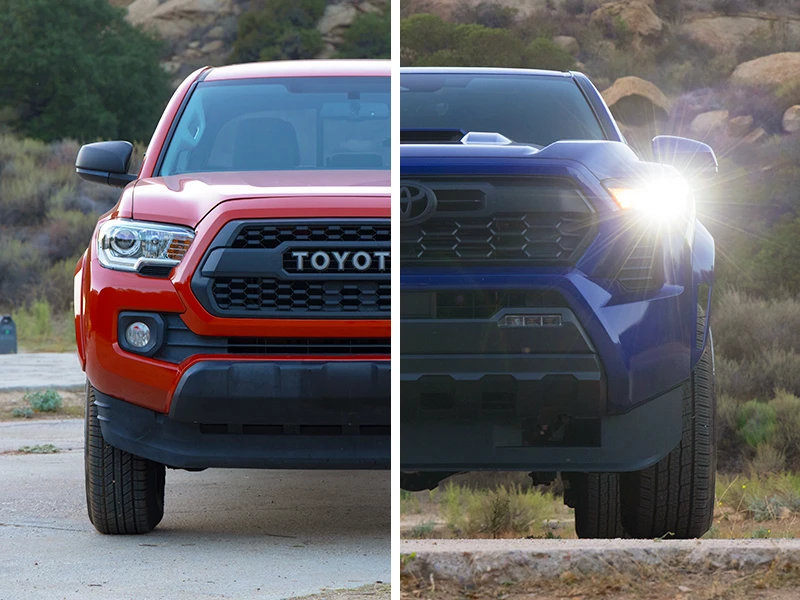Time in nature makes me happy. So, when it was time to upgrade my vehicle, I purposely looked for something that would not only meet my daily driving needs but could also amplify my weekend camping adventures.
In the summer of 2023, I bought a new-to-me preowned 2017 Ford Explorer Sport.
Before making the purchase, I did the usual test drives and asked car history questions, but I also practiced reclining the second and third-row seats to check for comfort and space for camping equipment. I also asked about the four-wheel-drive capabilities for rural excursions on gravel roads and where to find the power outlets and USB ports.
After all, I need to be ready to go—anywhere!
What Kind of Car Works for Camping?

The type of vehicle you choose for camping will depend on who is planning to go. For me, it's usually just me and my little rescue dog, Archie. We have more than enough space to go camping with our SUV.
However, when I was shopping, I did look at a few Chrysler Town and Country and Dodge Grand Caravan minivans that could convert to camper vans for the weekend with Stow n’ Go® seating in select trims. I've also seen people interested in the Ford Transit cargo vans to accommodate car camping.
I also think a station wagon would make an ideal camping vehicle thanks to the large space at the rear. It's all about finding the shape and style of a vehicle that works well for your needs.
For me, third-row seating was a must-have, so I could fold them down and have a large open space. My daily driving configuration has the third row stowed and one seat up in the second row. This gives me flat space for my dog's bed, water bowl, food bowl, toys, and anything I might want to haul in the rear of the car.
This is part of our Living With Your Car series. Read how other car owners use their vehicles for daily driving and weekend excursions.
Is it OK to Camp in Your Car?
There are rules for camping. If you plan to get a vehicle to visit state parks and other designated camping areas, simply ask if car camping is allowed alongside the RVs. Usually, it's no big deal.
On my first car camping trip, I parked my Ford Explorer Sport between two big RVs facing a small lake, and none of the park staff or other campers said anything negative. They were all very kind, and many asked about my camping setup!
Before heading out, do your safety research and check your car’s user manual or manufacturer information for any questions about proper use of your vehicle. Keep these tips in mind:
Do a vehicle check-up. This includes checking the tire pressure, oil levels, and making sure all lights work before you begin your trip.
Before setting up camp, ask the location you intend to camp at if camping is allowed. It can be illegal to sleep in your car in some locations or business parking lots, even if it is a rest stop or 24-hour gas station.
Just like normal camping, make sure all food, water, and valuables are packed away at night.
Pack portable chargers or a solar-powered charger to use when your car is off.
Be sure to properly ventilate the car by cracking the windows or using screen covers over open windows if you’re in it for a long period of time.
Always make sure you have enough gas—or lots of charge if you have an EV.
Practice Leave No Trace guidelines and pack out all trash and equipment when you leave the campsite.
What Car Camping Essentials Should I Pack?
Now, let's get down to business! Once you find the perfect vehicle for camping, you'll need to pack a few essentials.
If your vehicle allows, choose a camping mattress that fits the width and length of the space you have open in your vehicle. I like a foam folding mattress for its durability. My first camping trip was on an air mattress, and it popped in the middle of the night from rubbing against the metal seat hinges when I rolled around.
You'll also need bedding that is cozy and easy to wash. I like layering light blankets to control my comfort level. As I tend to camp in mild temperatures, I also like to put screen covers over my windows to allow fresh air (but no bugs!) into the car at night.
Since my dog travels with me, I also pack everything he needs. This includes his bed, food, harness, a 50-foot training leash for exploring, a long leash for the campsite, portable water and food bowls, bottled water, dog-safe sunscreen spray, and herbal-based bug repellant spray.
Other must-have car camping essentials include:
Shades for the front, rear, and side windows for privacy and to block out early morning sunshine.
Solar-powered chargers or portable chargers that you can charge during the day when your car is on (chargers won’t work when your car is off).
A battery-operated weather radio to stay informed in areas without internet service or car radio signal.
A small basket or cloth bag to store shoes in so the car doesn't get dirty.
A small tent is a great place to store supplies (cooler, clothes, etc.) outside the car during the day. It's also a great place to get dressed in the morning!
Beyond that, pack your usual camping supplies, including clothing, food, cooking gear, flashlights, and any activity equipment, such as walking poles for hiking or an inflatable kayak for exploring small lakes.

Can My Pet Car Camp with Me?
Some pets do well with camping in a car, while others do not. I recommend planning a trial car camping night in your driveway, if open, outdoor space allows. You'll quickly discover how your pet handles being in a car with you for hours at a time in the dark. My boy Archie curled up beside me and fell asleep, just like he does in the house.
When you're ready to try a campground, check the rules for pet information. Most pet-friendly campgrounds require the use of a leash or tie out and that you pick up after your pet. Easy!
A trial run at home can also help you discover what else you might need for your adventures away.
Why is Car Camping So Popular?
Car camping works for me because it's an easy and economical way to travel. I don't have to hook up a trailer or maneuver an oversized RV. Also, the cost is much less than a hotel room or cabin. In Iowa, where I travel most often, the cost is usually $10-30 per night at a campground in an RV or tent spot that offers electrical outlets and water access.
I also like that I get to surround myself with nature and unique activities that don't come with a hotel stay. Last summer I was in a campground on the Mississippi River backwaters and spent an afternoon trying out a paddleboat and an aqua bike with my family.
There's something magical and relaxing about waking up to a peaceful view, cooking breakfast outside on a campfire (or electric skillet), and then going for a slow trail hike to start your day.
Get inspired by reading these related articles:
Road Trips in an Electric Car: 4 Owners Say It’s Easier Than You Think
Beyond Towing Capacity: Towing Tech That Makes Your Life Easier




